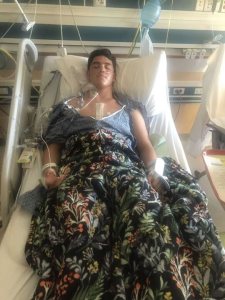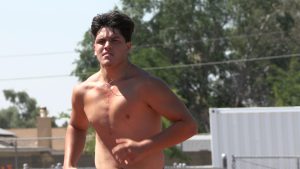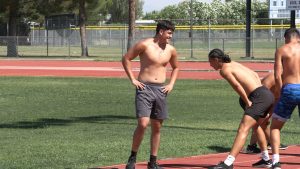- Slug: Sports-Cactus Jones Heart Surgery, 1,400 words.
- 4 photos available.
By Keion Cage
Cronkite News
GLENDALE – After leading teammates through a day of offseason training in the 100-degree heat in June, a shirtless Raymond Jones panted as he walked on the Cactus High School track. Jones had just finished running sprints, and a 10-inch scar in the middle of his chest raised and lowered as he caught his breath after emptying his tank to prepare for the Cobras’ upcoming football season.
The Cactus lineman and linebacker has faced many obstacles, but underneath his shoulder pads lies the challenge he faces every day – a heart defect. For 17 years, Jones has dealt with everything from intense colds to difficulty breathing but his heart keeps him going – in more ways than one – thanks to his family, teammates and self-determination.
“I would say my heart is made up of the people around me. People around me have influenced me and made me the person who I am,” Jones said. “My mom says (my heart is) made of steel and made of gold … I’m going to keep pushing, continuing to get better.”
Born with a ventricular septal defect (VSD), Jones has a hole in his heart. According to the Centers for Disease Control and Prevention (CDC), the birth defect creates a hole in the septum that separates the two lower ventricles of the heart. Doctors told his mother, Sabrina Romero, the hole could shrink or close with age, but it never fully healed.
“The pediatrician would tell us that when he gets sick, it’s more serious because he has a heart condition,” Romero said. “He is not like any other kid. A cold has to be taken more seriously for him … So he couldn’t get wet sometimes (because) when he got wet, he was sick the next day. … It was just something that he and I were having to get monitored every year.”
Since giving birth to Jones, Romero knew his life would be different. She made an extra effort to ensure he never felt different than his four siblings and peers – one of the driving reasons she let him play sports with a doctor’s approval.
“I never restricted him from playing sports. I think that would have had a whole another impact on him (if I didn’t let him play sports),” Romero said. “(Jones) was raised on the field going to his brother’s high school and college games … They’re brothers. (Scott) is five years older. So he’s kind of like his protector. They did have their little sibling (rivalry). They annoy each other, but they’re very close.”
To Jones, there were no limits. He was inspired by his brother, Scott, who was an All-State defensive lineman for Cactus. Growing up, Jones would enter his older brother’s room to wear his football equipment and pretend to play wide receiver and quarterback in the kitchen.
Football meant everything to him.
“He has been talking about football (since first grade). I’d hear from his teachers how he knew all the college teams, the state that they’re in and their mascot,” Romero said. “When you see your kids doing what they love and happily fulfilling their passion, there’s nothing more fun for me.”
Before touching the field every season, Jones has to bring his physical performance form to a cardiologist and anxiously hope his doctor approves him to play the game he loves. In 2022, that day almost came.
Two months before last season, his doctor informed Jones and his mother that his ventricular septal defect was causing subaortic hemorrhage – which is defined by bleeding in the space between the brain and the surrounding membrane, according to Mayo Clinic. Surgery was required to repair the congenital condition and would sideline him for the upcoming season.
Jones had persevered through many health challenges but when his doctor told him he could miss the whole season, it became another obstacle to overcome.
“It’s just been getting worse and they had got in to fix it before it gets any worse,” Jones said. “I knew my mom was scared as soon as they told us. I could see it. I was a little scared too, but I had to act strong for my mom. I didn’t want her to be worried or think that I was worried.”
As interest grew from Division II schools, the desire to play at the collegiate level like Scott was far too great for Jones to miss a season. He was determined to do everything in his power to play football his junior year, even if that meant putting the surgery on hold.
“We kind of decided as a family because we knew that he wanted to get as much playing time so we tried to plan it around the season,” Romero said. “I was more concerned with him missing education … But it was really just a lot of worries and thoughts and we didn’t know for sure. The surgeons were very positive and told us that it would be OK.”
After conversations with cardiologists and family, Jones put off his surgery until after the 2022 season with the agreement that he stayed in constant communication with his parents, coaches and trainers about his condition.
Jones helped lead Cactus to a 2022 5A State Championship game, where they lost 41-21 to Higley High School. Despite the loss, Jones finished the season leading the team in total tackles with 103, and ranked second on the team in solo tackles with 27 and third in tackles for a loss with 10.
“(Cactus) had a lot of expectations for last year and my team really needed me. So I wanted to be there for them which ended up working out,” Jones said. “We made it all the way to state and we fell short, but I’m glad I got to play last season.”
Despite the fear surrounding his forthcoming surgery, the desire to play for his senior year was stronger. Shortly after the Cobras finished as state runner-up in January, Jones underwent surgery. Like every other year, the question of whether Jones would be able to play football remained the same, this time for a different reason.
“It was long and hard,” Jones said about his recovery. “I couldn’t even walk after a few days in the hospital … My mom had to feed me, and it was a long hard time in the hospital.”
Meanwhile, Jones did everything he could to support his teammates. He showed up to watch workouts and served as a vocal leader in the locker room to ensure that he did not miss a beat. After three months of physical therapy and healing, Jones got the green light to play his senior season.
“The hard part was to make sure that (Jones) doesn’t try to hurry up to get back into the gym or try to go running or do anything,” Romero said. “It was more of just watching him and making sure that he was (doing anything) the way (the doctors) told him to, which was minimal activity.”
In his three years in the program, Jones’s determination and leadership have become instrumental to the football program’s success. On an off day from football training in June, Jones was on the track with his teammate Braiden Lagafuaina, who ran extra laps on the track to make up for missing training. During Lagafuaina’s final few laps, Jones took his shirt off and ran with him.
“[Jones] is always there pushing our kids in the weight room on the track. He’s definitely the vocal leader of our team,” Cactus coach Brian Belles said. “He’s got a lot on his plate and a lot of responsibility. But I think he enjoys that aspect of it when you find out about his heart conditioning … [because] this is another hurdle that he is going to overcome.”
Jones’s offseason training program is dedicated to preparing for another state title run. On the way, he hopes to follow in Scott’s footsteps by leaving a similar impact on his younger brother, John Jones, who is a rising junior and plays running back at Cactus.
Every time Jones looks in the mirror and sees his scar, it is a reminder of his purpose.
“I’ve been through a lot and accomplished a lot of things, but I’m not done yet,” Jones said. “I definitely see (my heart defect) as an advantage. It only made me stronger. I like to show my teammates that every time I see one of them hurting, I’m like, ‘It’s the stuff I went through to get back to where I am too.’ I just hope that they can look up to me and see that if I could do it with all the stuff that I’ve been through that they can do it too.”
For more stories from Cronkite News, visit cronkitenews.azpbs.org.


